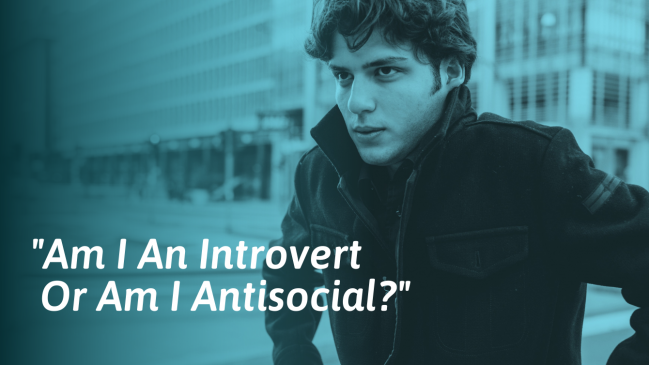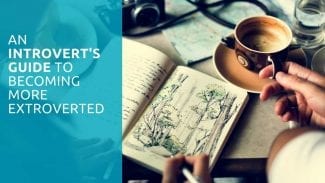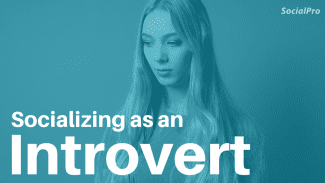“I don’t really like socializing very much. I often avoid people, even if I know them. Am I antisocial or introverted? How can I find out?”
When psychologists talk about antisocial people, they are usually talking about those who behave in a way that is both abnormal and harmful. For example, an antisocial person might behave in an aggressive way, shoplift, or commit fraud.[1]
But in this article, we’re going to use the more informal, everyday definition of “antisocial:” someone who is not sociable and doesn’t want to be in the company of other people.
It’s not always easy to spot the differences between introverts and antisocial people. They share a few preferences, such as a love of alone time and a dislike for small talk.
Here’s how to tell whether you’re antisocial or introverted.
1. Ask yourself, “Do I ever enjoy being around other people?”
Introverts tend to dislike large groups and superficial conversations. But they usually value having a few close friends in their lives. Research shows that close, healthy relationships can help introverts feel happier.[2]
Antisocial people don’t enjoy spending time with people at all and don’t find relationships rewarding. They are unlikely to seek out friends or make an effort to get to know people in their community.
2. Consider how you feel after socializing
One of the hallmarks of introversion is a need to recharge alone after socializing.[3] Some introverts claim to get “introvert hangovers” after social occasions that leave them feeling fatigued, irritable, and craving time alone.
This isn’t always true of antisocial people. If they are forced to come into contact with others—at work, for example—an antisocial person may be annoyed or bored, but not necessarily exhausted or drained.
3. Notice how you use social media
Compared to extroverts, introverts have smaller friend networks on social media, share fewer photos, and share less personal information.[4] Extraverts are also more likely to use social media to maintain their friendships.[4] But if you’re an introvert, you may still find social media useful as a way of catching up with friends and meeting new people.
If you’re antisocial, you might use social media to keep track of news stories that interest you rather than to connect with other people. Or perhaps you use it only for professional reasons, such as sharing articles relating to your industry.
This isn’t a hard and fast rule because some people choose not to use social media at all, but it can be a useful pointer.
4. Think about your relationship goals
Most introverts are interested in having a romantic relationship at some point in their lives. But if you are antisocial, the idea of dating someone and spending a lot of time together may sound unappealing. You may choose to stay single because relationships need more work than you’re willing and able to give.
The same thing might apply to friendships. If you’re an introvert, you might wish you had a best friend, but if you’re antisocial, you probably don’t feel the need for companionship.
5. Assess how much stimulation you can tolerate
Introverts are overwhelmed by noise and other stimuli more quickly compared with extroverted people.[3] They usually prefer a quiet coffee shop, park, or library over a crowded bar or busy theme park. If an introvert chooses to attend a large party, they will probably leave earlier than the more extraverted guests.
If you’re antisocial, this doesn’t necessarily apply to you. You might love high-adrenaline activities and be happy in stimulating environments as long as you don’t have to interact with other people.
6. Think about how often you open up to others
Introverts are often described as “hard to get to know.”[5] They don’t like small talk, preferring to have meaningful conversations and share personal information with people they like and respect.
Antisocial people are different: they are also hard to know, but this is because they prefer not to open up at all. They don’t want to reveal their innermost thoughts and feelings or talk about their problems.
7. Ask yourself, “Do I like to reflect?”
Introverts are inward-looking. They typically like to analyze their own thoughts and behaviors.[3] An antisocial person may or may not enjoy spending time in quiet reflection. They may prefer to fill their time with more active hobbies.
8. Think about your career goals
When you dream about your ideal career or job, where do other people fit into your vision? For example, if you dream of making art for a living, would you like to make a few meaningful connections in the art world, or do you imagine living in complete peace and quiet in a studio with no visitors?
If you always want to work entirely alone and can’t imagine collaborating with anyone else, you may be antisocial rather than introverted.
Antisocial people and introverts also differ when it comes to leadership potential. Contrary to popular stereotypes that extroverts make the best leaders, some introverts can be successful as managers.[6] But if you’re an antisocial person, it’s unlikely that leading a team appeals to you.
9. Ask, “Do I want to get to know people?”
Introverts are usually willing and able to empathize with other people. They don’t usually want a large social circle, but if they meet someone they like, they may be keen to learn how the other person thinks and feels.
If you are antisocial, you might be interested in people from an academic point of view but have no real interest in getting to know them as individuals. For example, you might enjoy reading books about psychology or sociology but have no desire to learn anything about your colleagues at work.
10. Assess your mental health
Both introverts and antisocial people can experience mental health problems. But while introversion is a common personality trait, being antisocial and cutting yourself off from social interaction can be a sign of an underlying issue.
If you don’t enjoy social interaction and stay away from social situations as much as possible, this is called social anhedonia.[7] Research suggests that social anhedonia can be a symptom of depression, eating disorders, post-traumatic stress disorder (PTSD), and other types of mental illness.[7]
If you know or suspect that you have a mental health problem, consider getting treatment. You may find that as your mental health improves, you’ll want to spend more time with other people. You can find a therapist online using BetterHelp.
11. Check whether you have typical introvert traits
If you still aren’t sure whether you’re an introvert or antisocial, it can help to compare your behaviors and preferences with common introvert traits.
For example, introverts tend to:[3]
- Take time to think before they speak
- Prefer to work on projects that give them an opportunity to dive deeply into an interesting topic
- Avoid conflict where possible
- Enjoy expressing themselves in writing
- Take their time when making decisions
Bear in mind that not all introverts share all the traits on this list. If you want to learn more about what it means to be introverted, check out this list of best books for introverts.
It can also help to remember that introversion isn’t an all-or-nothing trait. You can be moderately or extremely introverted. Labels can be a useful shorthand for describing your personality or behavior. But what’s more important is whether you feel happy with your social life. Whether you’re an introvert or antisocial, you can learn to become more socially adept.
Is it bad to be antisocial?
Avoiding all human contact can be unhealthy. For most people, regular social interaction is key to good mental health.[8] If you don’t like socializing, it can help to work out why.
For example:
- If you often feel awkward, improving your social skills can make social situations more appealing.
- If you tend to be cynical, making an effort to look for good qualities in people may help.
- If you spend too much time online and feel detached from people in face-to-face settings, cutting down on your internet use might be a good idea.
- If you are feeling generally tired or burned out, you may not want to socialize. Improving your work-life balance could give you more energy to socialize and boost your mood.
For more suggestions, check out our article on reasons why you might be antisocial.
Common questions about being introverted versus antisocial
What does it mean to be antisocial?
Psychologists use the term “antisocial” to describe someone who violates social norms. For example, an antisocial person may often be aggressive. But in everyday language, “antisocial” describes someone who doesn’t want to spend time with other people.
Is being introverted the same as being shy?
No. Introverts need to replenish their energy by spending time alone.[3] Social activities can leave them feeling drained. Shyness is different because shy people don’t necessarily find social situations tiring. However, they may be nervous around other people even if they want to socialize.





